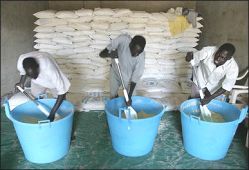Sudan’s embattled Darfur region braces for `hunger season’
KHARTOUM, July 15, 2005 (Bloomberg) — Haroon Adam Sharif kicks at the dirt outside his cousin’s hut and complains that he doesn’t know how he and his two wives and 11 children will survive the “hunger season” in Sudan’s Darfur region, where a two-year conflict has killed 180,000 people and driven 2 million from their homes.

|
|
Sudanese workers of the humanitarian organization Care International prepare food for Care feeding Centers in Nyala town in Sudan’s south Darfur region.(AFP). |
The Irish aid agency Goal is distributing seeds to people in the volcanic rock hills of the Jebel Marra region who fled their homes after a government crackdown against rebels. Sharif, 53, says nomadic herders and government-backed “Janjaweed” militias bring their animals to graze as soon as the green shoots appear.
“I used to earn money by gathering firewood with my two donkeys, but the Janjaweed stole my donkeys,” Sharif, who is a sheikh, or village leader, said in an interview in Bardani, about 650 miles (1,040 kilometers) southwest of Khartoum, Sudan’s capital. “Now, I earn some money working as a casual laborer on road projects or other people’s vegetable gardens.”
Aid agencies led by the United Nations World Food Program are accelerating food distributions in Darfur, a region the size of France, to prepare for the three-month period between planting and the harvest called the hunger season. As many as 3.5 million lives are at risk in Darfur, according to the UN, which is distributing $561 million of food in the region. Sudan, whose neighbors include Egypt and Libya, has a population of 40 million.
“We are at this moment at the beginning of the worst period: the `hunger season’,” said Carlos Veloso, the World Food Program’s emergency coordinator for Darfur. “While all indicators of malnutrition in Darfur are far below those of last year and there is a decrease in violence, there is still insecurity.”
Crisis
The crisis in Darfur started in 2003 when the government, responding to rebel attacks, organized nomadic herders and some Arabic tribal militias into a counterinsurgency force known as the Janjaweed, or “bandits” in the Western Sudanese dialect. While the nomads call themselves Arabs and the farmers Africans, both groups are black, Muslim and speak Arabic.
Sharif says his and 107 other families walked to Bardani last year after Janjaweed militiamen accused them of supporting the Sudan Liberation Army rebel movement, burned down their village of Osega and killed two of his neighbors.
“They came on their camels and with their rifles in the middle of the day, accused us of supporting the SLA, and ordered us leave,” he says. “We still don’t feel safe here because the Janjaweed are just over the hill waiting for us to try to go to our fields and farm.”
U.S. Food Aid
The U.S., which is providing about half the money the World Food Program is spending to feed the people of Darfur, says it won’t consider lifting its decade-old economic sanctions against Sudan unless there is a peace in Darfur.
Until sanctions are lifted, U.S. companies won’t be able to invest in Sudan’s booming oil industry, the third biggest in sub- Saharan Africa after Nigeria and Angola.
Sudan’s government says oil output will rise to more than 500,000 barrels a day in August from about 340,000 barrels a day now. The increase will come from exploration plots in southern Sudan, where China National Petroleum Corp., China’s largest oil company, has a stake. Oil from fields in Darfur should start flowing next year, according to the government.
Steve Langdon, Goal’s field coordinator the village of Golo, about a mile from Bardani, said that besides threats by government- organized militias, other conflicts arise between the farmers and nomads.
“When the nomads get too close to the farmers, it creates a flashpoint,” Langdon said. “There used to be tribal mechanisms to work out this friction, but now there is a lack of trust and there is no civilian authority to mediate.”
`Terrible Situation’
U.S. Deputy Secretary of State Robert Zoellick, whose government last year accused Sudan’s government of carrying out “genocide” in Darfur, says violence has eased in recent months.
“It’s still a very terrible situation,” Zoellick told reporters in Khartoum on July 9 after a one-day visit to the Jebel Marra region. “Right now the militias might not be in an active state of offensive action, but they are still threatening people.”
The African Union now has 3,320 troops in Darfur, including 450 observers and 815 police officers, and is set to double that number by October before increasing it to 12,000 in 2006. North Atlantic Treaty Organization members have started airlifting African troops into Darfur.
Unity Government
President Omar al-Bashir and the leader of Sudan’s southern rebel movement, John Garang, who was sworn in on July 9 as Sudan’s First Vice President, have said their unity government will work to end the Darfur violence as soon as possible.
Sudan on July 10 lifted a 16-year-old state of emergency, except in Darfur and the east, a day after approving a constitution that provides a bill a rights and guarantees freedom of religion and expression.
“My test for Darfur is whether there is a peace that will allow people to return home voluntarily,” Zoellick said.
Sharif in Bardani says he wants to leave, but won’t be able to do so unless the Janjaweed militias withdraw.
“Even though the people of Bardani allow us to come here, it’s like living in someone else’s house,” he said. “I have nothing here.”
